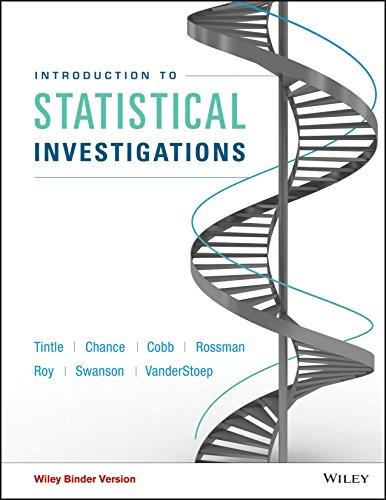Use the data where Janine serves 17 out of 30 right handed short serves into the court.
Question:
Use the data where Janine serves 17 out of 30 right handed short serves into the court. In order to discern whether or not Janine can serve a majority of her short serves in, we will employ the 3S strategy.
a. Statistic: How many times did Janine get a short serve in? Out of how many service attempts?
b. Simulate: Using an applet, simulate 1,000 repetitions of having Janine serve 30 right-handed short serves if she is just as likely to serve in as she is to not serve in.
c. Based on the value of the statistic from part (a), do you think the chance model is wrong? Why or why not?
d. Strength of evidence: Based on your answers for (a)–(c), state your conclusions about the research question of whether the data provide convincing evidence that Janine can get her short serve in with her right hand more than 50% of the time?
e. Are the results of this study statistically significant or is the chance model plausible? How are you deciding?
f. Does this mean that Janine can serve a short serve in with her right hand 50% of the time? Explain.
Janine is an ambidextrous volleyball player. She is practicing “short serves” in volleyball because her team has an upcoming match against an opponent who does not pass short serves very well. Janine must land a majority of her “short serves” in bounds or her coach will not let her use her short serve in the upcoming match. When serving left - handed Janine makes 23 out of 30 serves.
Step by Step Answer:

Introduction To Statistical Investigations
ISBN: 9781118172148
1st Edition
Authors: Beth L.Chance, George W.Cobb, Allan J.Rossman Nathan Tintle, Todd Swanson Soma Roy





